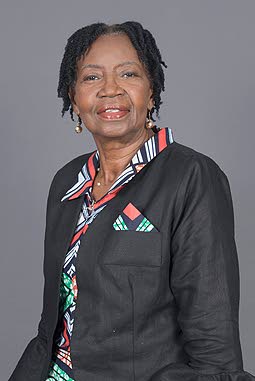Charting a green future
Written by Andrew Gioannetti on December 5, 2024

THIS COUNTRY stands at a critical crossroads, grappling with the twin imperatives of addressing climate change and sustaining economic growth.
The 2024 Report on Economic Development (Red) by CAF (Development Bank of Latin America and the Caribbean) was launched on December 2, marking the 30th anniversary of TT’s partnership with the bank.
Finance Minister Colm Imbert, delivering opening remarks at the Central Bank auditorium, Port of Spain, suggested this relationship was as critical as ever.
Imbert described CAF as his favourite bank and credited former finance minister and Central Bank governor Winston Dookeran for helping him see its value years ago.
“Allow me to begin by expressing my sincere gratitude to CAF for its dedication to development in the region,” Imbert said. “Through its research, financial initiatives, and steadfast commitment to becoming a ‘green and blue’ bank, CAF continues to be a pillar of support, promoting sustainable development and fostering social and economic resilience across our nations.”
Stacy Richards-Kennedy, CAF’s regional manager, and Lian Allub, principal economist at CAF’s department of socioeconomic research, made resounding calls for strategies tailored to TT’s unique context.
Richards-Kennedy focused on the transformative power of research and data in navigating these challenges.
“Research and data analysis constitute one of our most valuable assets,” she said. “They allow us not only to make informed decisions about our present and future actions but to optimise the use of scarce resources.”
Energy transition: Complex balancing act
This year’s report spotlights energy transition, an issue especially pertinent to TT, where the oil and gas sector accounts for approximately 27 per cent of GDP.
Imbert highlighted the challenges facing small, energy-dependent economies: “For countries that have few alternative sources of income, the future will be difficult. TT’s energy transition must be measured and sensible.
“Continuing this heavy reliance on fossil fuel exposes these economies to volatility in prices in the global energy markets and continues environmental degradation.
“For the region, a just energy transition offers a chance to foster economic growth by means of investments in green technologies, energy efficiency and renewable energy.
“For example, the creation of green jobs can aid economic diversification and reduce unemployment, particularly in regions that presently rely on fossil fuel industries.”
CAF’s report also acknowledged the unique challenges facing hydrocarbon-rich economies, particularly in transitioning to renewable energy. Allub said TT’s hydrocarbon reserves could sustain current consumption levels for over 200 years, making a rapid pivot to renewables potentially destabilising to the economy.
Allub said the transition must strike a balance between reducing emissions and ensuring economic stability, noting that all electricity in the country is currently generated from natural gas.
The report also found that achieving net-zero targets will require a fourfold increase in electricity generation from renewable sources, complemented by natural gas as a transitional backup. This would necessitate substantial investments in infrastructure, including doubling the electricity grid to accommodate the intermittency of renewable energy sources.
Richards-Kennedy addressed the broader implications of the energy transition for the Latin America and Caribbean (LAC) region.
“This year’s report (titled Renewed Energies: A Just Energy Transition for Sustainable Development) reflects the urgent need for equitable and sustainable solutions tailored to the region’s socio-economic realities.”

ENERGY TRANSITION: Investing in renewable energy. –
Imbert also addressed the significance of a just energy transition in the context of the UN sustainable development goals (SDGs), the interconnections between energy access, resilient infrastructure and sustainable cities.
“The LAC region is particularly susceptible to the impacts of climate change, such as floods, droughts, hurricanes and rising sea levels,” Imbert said. “These events disproportionately affect low-income communities, worsening inequality and poverty. Transitioning to clean energy can greatly diminish greenhouse gas emissions and help safeguard the region’s resilience.”
Allub cautioned against adopting a one-size-fits-all approach. “We must not treat the region as a homogeneous bloc. Each nation faces unique challenges when addressing economic growth and the need for inclusion,” he said.
The report advocates for innovative policy tools to facilitate the energy transition, including carbon taxes, green financing and carbon markets. Imbert pointed out that some developed nations such as Germany and Denmark are already implementing policies to phase out fossil fuels.
“International co-operation and, most importantly, political will and commitment are key,” he said. “The global nature of climate change requires a co-ordinated response, as emissions reductions in one country may be undermined by continued fossil-fuel extraction in another.”
Imbert also highlighted the importance of addressing the social and economic impacts of the transition, particularly for communities reliant on fossil-fuel industries.
“The cultural dimension of this transition is important, since public endorsement and participation are necessary for the successful phasing out of fossil fuels, simply because public perception and politics impact climate policies.
“Engaging communities and stakeholders in the transition process is critical for building consensus on the need for change and alleviating concerns regarding job losses, revenue loss and the economic impacts associated with the decline in the fossil fuel industry.
“This can be achieved through educational and awareness programmes that highlight the many benefits of renewable energy, including potential lower costs to consumers and the long-term sustainability of transitioning from fossil fuels.”
He said the financial sector is key to the transition.
“The analysis of pension funds reveals a trend of divestment from fossil-fuel assets, although several such institutions are still concerned about this issue.
“Over time, financial institutions are expected to adopt divestment strategies to reallocate investments to renewable energy projects, thus accelerating their deployment and adoption.”
The report addressed the need for workforce upskilling to adapt to new technologies and roles created by the energy transition.
Richards-Kennedy stressed the importance of targeted investments in education and training to ensure the workforce is prepared for these changes.
The report outlines several sector-specific strategies, including adopting circular economy principles and cleaner fuels in industries like cement and steel. Urban transport electrification and cleaner fuels for freight transport present additional opportunities to reduce emissions.
Richards-Kennedy also lauded TT’s partnership with CAF in advancing these initiatives. CAF has provided over US$1 billion in loans for development projects in the country, including road construction, health-system strengthening and developing a digital tax-payment ecosystem.
Imbert called for a balanced approach to the energy transition that considers the country’s economic realities and global environmental responsibilities.
“Our energy transition is not simply about reducing emissions; it is about building an inclusive, resilient, and forward-looking economy that secures a prosperous future for TT and the wider LAC region,” he said.
Richards-Kennedy urged stakeholders to use the report’s findings to guide the nation’s efforts.
“Let us work together to chart a more sustainable and resilient future,” she said.
The post Charting a green future appeared first on Trinidad and Tobago Newsday.




